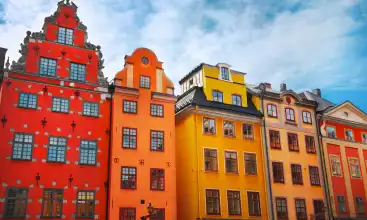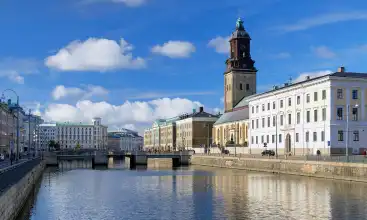- Over 1 million successful rentals

Car Hire Sweden
Save time and money. We compare the offers of car rental companies in Sweden on your behalf.
- Free cancellation Up to 48 hours prior to the scheduled pick-up time
- Best price guarantee Have you found a better price? Let us know and we will make you a better offer.
- 24000+ pick-up locations Locations around the world

Compare Car Hire
Carrentals.co.uk offers simple and straightforward car hire comparison services. We don't add a penny to your quotes!
Car rental offers in Sweden
Whether you're looking for a small rental car or a station wagon for the entire family, we will always have a suitable vehicle at the lowest price. Below are some examples from our selection in Sweden.

-
Thrifty From£ 19 /day

-
Budget From£ 19 /day -
Avis From£ 22 /day

-
Budget From£ 20 /day -
Avis From£ 24 /day

-
Hertz From£ 22 /day -
Alamo From£ 33 /day -
Enterprise From£ 40 /day

-
Thrifty From£ 24 /day

-
Hertz From£ 30 /day -
Alamo From£ 37 /day -
Enterprise From£ 45 /day

-
Alamo From£ 30 /day -
Enterprise From£ 41 /day

-
Alamo From£ 34 /day -
Enterprise From£ 40 /day

-
Budget From£ 17 /day -
Avis From£ 20 /day

-
Budget From£ 19 /day -
Avis From£ 20 /day -
Sixt From£ 39 /day

-
Budget From£ 20 /day -
Avis From£ 23 /day -
Sixt From£ 45 /day

-
Europcar From£ 19 /day

-
Budget From£ 20 /day -
Avis From£ 22 /day -
Sixt From£ 39 /day

-
Budget From£ 23 /day -
Avis From£ 25 /day

-
Alamo From£ 21 /day -
Hertz From£ 22 /day -
Enterprise From£ 22 /day

-
Budget From£ 23 /day -
Avis From£ 25 /day -
Sixt From£ 45 /day

-
Hertz From£ 21 /day

-
Europcar From£ 16 /day

-
Europcar From£ 17 /day

-
Europcar From£ 19 /day

-
Budget From£ 19 /day -
Europcar From£ 22 /day

-
Europcar From£ 19 /day

-
Budget From£ 19 /day

-
Budget From£ 21 /day -
Europcar From£ 25 /day

-
Budget From£ 20 /day -
Avis From£ 24 /day -
Thrifty From£ 24 /day

-
Hertz From£ 20 /day -
Thrifty From£ 25 /day

-
Hertz From£ 22 /day -
Thrifty From£ 26 /day

-
Europcar From£ 22 /day

-
Hertz From£ 23 /day -
Thrifty From£ 28 /day

-
Europcar From£ 22 /day

-
Europcar From£ 23 /day

-
Hertz From£ 25 /day -
Thrifty From£ 29 /day -
Alamo From£ 39 /day

-
Europcar From£ 24 /day -
MABI From£ 39 /day

-
Europcar From£ 25 /day

-
Budget From£ 25 /day -
Avis From£ 28 /day

-
Europcar From£ 21 /day -
Budget From£ 29 /day -
Avis From£ 33 /day

-
Europcar From£ 22 /day -
Budget From£ 34 /day -
Avis From£ 34 /day

-
Budget From£ 24 /day -
Avis From£ 29 /day

-
Thrifty From£ 25 /day -
Hertz From£ 27 /day -
Sixt From£ 39 /day

-
Hertz From£ 26 /day -
Thrifty From£ 32 /day

-
Europcar From£ 25 /day

-
Budget From£ 26 /day -
Avis From£ 27 /day -
Sixt From£ 33 /day

-
Budget From£ 27 /day -
Avis From£ 29 /day -
Sixt From£ 35 /day

-
Hertz From£ 26 /day -
Thrifty From£ 29 /day

-
Sixt From£ 28 /day

-
Hertz From£ 29 /day -
Thrifty From£ 29 /day -
Sixt From£ 32 /day

-
Hertz From£ 31 /day -
Thrifty From£ 35 /day -
Sixt From£ 42 /day

-
Sixt From£ 31 /day

-
Budget From£ 35 /day

-
Sixt From£ 32 /day

-
Budget From£ 33 /day

-
Sixt From£ 36 /day

-
Sixt From£ 39 /day

-
Hertz From£ 28 /day -
Thrifty From£ 31 /day

-
Hertz From£ 29 /day -
Sixt From£ 36 /day -
Thrifty From£ 43 /day

-
Hertz From£ 32 /day -
Thrifty From£ 36 /day

-
Budget From£ 33 /day -
Hertz From£ 39 /day -
Thrifty From£ 44 /day

-
Budget From£ 34 /day -
Hertz From£ 41 /day -
Thrifty From£ 49 /day

-
Sixt From£ 35 /day

-
Europcar From£ 36 /day

-
Sixt From£ 35 /day

-
Budget From£ 35 /day -
Avis From£ 35 /day -
Europcar From£ 37 /day

-
Europcar From£ 21 /day -
Budget From£ 29 /day -
Avis From£ 33 /day

-
Budget From£ 21 /day -
Avis From£ 23 /day -
Hertz From£ 27 /day

-
Europcar From£ 22 /day -
Budget From£ 34 /day -
Avis From£ 34 /day

-
Budget From£ 22 /day -
Avis From£ 26 /day -
Hertz From£ 31 /day

-
Europcar From£ 22 /day -
Alamo From£ 51 /day -
Enterprise From£ 58 /day

-
Budget From£ 23 /day -
Avis From£ 26 /day -
Hertz From£ 56 /day

-
Europcar From£ 25 /day -
Alamo From£ 58 /day -
Enterprise From£ 66 /day

-
Europcar From£ 24 /day -
Budget From£ 30 /day -
Sixt From£ 32 /day

-
Europcar From£ 27 /day -
Budget From£ 32 /day -
Sixt From£ 35 /day

-
Hertz From£ 50 /day -
Avis From£ 81 /day

-
Hertz From£ 51 /day -
Avis From£ 63 /day -
Budget From£ 65 /day

-
Hertz From£ 54 /day -
Avis From£ 64 /day -
Budget From£ 68 /day

-
Hertz From£ 54 /day -
Avis From£ 89 /day

-
Budget From£ 63 /day -
Europcar From£ 71 /day

-
Budget From£ 63 /day -
Europcar From£ 77 /day

-
Europcar From£ 65 /day

-
Europcar From£ 68 /day

-
Europcar From£ 69 /day

-
Sixt From£ 160 /day

-
Sixt From£ 160 /day

-
Sixt From£ 178 /day

-
Sixt From£ 182 /day

-
Sixt From£ 184 /day

-
Sixt From£ 184 /day

-
Sixt From£ 187 /day

-
Sixt From£ 189 /day

-
Budget From£ 20 /day -
Thrifty From£ 24 /day -
Sixt From£ 33 /day

-
Alamo From£ 23 /day -
Enterprise From£ 25 /day

-
Budget From£ 25 /day -
Sixt From£ 39 /day

-
Budget From£ 24 /day -
Avis From£ 50 /day

-
Alamo From£ 25 /day -
Enterprise From£ 31 /day

-
Thrifty From£ 25 /day -
Hertz From£ 27 /day -
Sixt From£ 39 /day

-
Europcar From£ 25 /day

-
Hertz From£ 26 /day -
Thrifty From£ 32 /day

-
Europcar From£ 25 /day

-
Budget From£ 20 /day -
Avis From£ 22 /day -
Sixt From£ 39 /day

-
Budget From£ 20 /day -
Avis From£ 24 /day -
Thrifty From£ 24 /day

-
Budget From£ 22 /day -
Avis From£ 25 /day

-
Budget From£ 20 /day -
Avis From£ 23 /day

-
Hertz From£ 22 /day -
Thrifty From£ 26 /day -
Sixt From£ 27 /day

-
Hertz From£ 23 /day -
Thrifty From£ 28 /day -
Sixt From£ 31 /day

-
Europcar From£ 22 /day -
Alamo From£ 34 /day

-
Budget From£ 23 /day -
Avis From£ 25 /day -
Sixt From£ 45 /day

-
Europcar From£ 23 /day -
Alamo From£ 36 /day -
Enterprise From£ 43 /day
Popular cities in Sweden




Popular rental locations in Sweden
-
Car Hire Stockholm Arlanda AirportFrom
£ 19 /day -
Car Hire Gothenburg Landvetter AirportFrom
£ 16 /day -
Car Hire Stockholm Skavsta AirportFrom
£ 17 /day -
Car Hire Luleå Kallax AirportFrom
£ 28 /day -
Car Hire Gothenburg StationFrom
£ 40 /day -
Car Hire Malmö Sturup AirportFrom
£ 24 /day -
Car Hire Skellefteå AirportFrom
£ 38 /day -
Car Hire Stockholm Bromma AirportFrom
£ 19 /day

When to book a rental car in Sweden
Sweden - When is the most affordable time to rent a mini class car?
At this destination (Sweden), January is the most affordable time to rent a mini class car with an average daily rate of
Sweden - When is the most affordable time to rent a economy class car?
At this destination (Sweden), January is the most affordable time to rent a economy class car with an average daily rate of
Sweden - When is the most affordable time to rent a compact class car?
At this destination (Sweden), January is the most affordable time to rent a compact class car with an average daily rate of
Sweden - When is the most affordable time to rent an intermediate class car?
At this destination (Sweden), January is the most affordable time to rent a intermediate class car with an average daily rate of
Sweden - When is the most affordable time to rent a standard class car?
At this destination (Sweden), January is the most affordable time to rent a standard class car with an average daily rate of
Sweden - When is the most affordable time to rent a full-size car?
At this destination (Sweden), January is the most affordable time to rent a full-size class car with an average daily rate of
Sweden - When is the most affordable time to rent a luxury car?
At this destination (Sweden), January is the most affordable time to rent a luxury class car with an average daily rate of
Sweden - When is the most affordable time to rent a station wagon?
At this destination (Sweden), January is the most affordable time to rent a station wagon with an average daily rate of
Sweden - When is the most affordable time to rent a SUV?
At this destination (Sweden), January is the most affordable time to rent an SUV with an average daily rate of
Sweden - When is the most affordable time to rent a MPV?
At this destination (Sweden), September is the most affordable time to rent an mpv with an average daily rate of
Sweden - When is the most affordable time to rent a minivan?
At this destination (Sweden), October is the most affordable time to rent a minibus with an average daily rate of
Sweden - When is the most affordable time to rent a sports car?
At this destination (Sweden), November is the most affordable time to rent a sports car with an average daily rate of
Sweden - When is the most affordable time to rent a convertible?
At this destination (Sweden), November is the most affordable time to rent a convertible with an average daily rate of
Sweden - When is the most affordable time to rent a sedan?
At this destination (Sweden), May is the most affordable time to rent a sedan with an average daily rate of
Sweden - When is the most affordable time to rent a delivery van?
At this destination (Sweden), September is the most affordable time to rent a van with an average daily rate of
Car rental locations in Sweden
Carrentals.co.uk compares rental car prices at the following destinations

Sweden Guide
Sweden is best explored by rental car. Carrentals.co.uk has over 220 pick-up locations in Sweden. This means there is always a pick-up location close to your destination.
Most popular car hire locations in Sweden
Driving
Sweden, the largest of the Nordic countries, shares many characteristics with its neighbours. It has a diverse range of attractions to offer, from cosmopolitan cities filled with history and culture to great wilderness. By car, visitors can drive to Abisko National Park to experience the legendary Northern Lights. Located in the south is Malmö, said to be the most beautiful city and an easy drive from Denmark thanks to the Öresund Bridge.
Driving Tips for Sweden
Sweden has a good and comprehensive road system that stretches for 130,000 miles. Driving here can be dangerous during the winter, from November to March. Winter tyres during this season are compulsory. Game such as moose and deer can also pose a problem on many roads so caution is advised.
Driving licences: EU or EC/EEA driving licences are accepted in Sweden. UK driving licences without a photograph need to be accompanied by other identification, such as a passport. Otherwise, an International Driving Permit is acceptable.
Which side does Sweden drive on: the right.
Speed limits:
Dual carriageways and highways (outside urban areas): 68mph (110kph)
National or provincial roads: 56mph (90kph)
Local roads: 31mph (50kph)
Urban roads: 31mph (50kph)
Alcohol limits: 0.02 per cent; much stricter than that UK limit of 0.08 per cent. Police have been known to apprehend drivers with an alcohol limit below the allowed limit. Fines, licence withdrawal and prison await prosecuted violators.
Driving age: 18 years.
Seatbelts: both front and rear seat occupants are required to wear seatbelts. Children aged seven or below cannot travel in a vehicle without a special child restraint.
Mobile phones and GPS: mobile phone use, which includes calling and texting, while driving is strictly prohibited. GPS devices must be programmed while the vehicle is not moving.
Cost of fuel in Sweden: unleaded petrol is slightly more expensive here than in the UK, while diesel is slightly cheaper.
Car hire and fuel payment: petrol stations as well as car rental companies accept credit cards as payment.
Insurance: third-party and fire insurance is usually included with car hire. Coverage for collisions is recommended.
Traffic and parking: visitors will find parking spaces easily, even in the large cities. Small towns, meanwhile, have limited parking as roads tend to be narrow. Sweden's parking rules are determined by date. This means that the side of the street which parking is permitted on depends on whether the calendar date is odd or even.
Transport
Trains
The railway network in Sweden is extensive. The main operator is Swedish State Railways. Routes connect many destinations, mainly in the southern half where most Swedes live, including Jönköping, Malmö, Gävle and Härnosand. Some trains run to the north, offering visitors a scenic ride through the country's woodland and lake areas. There is a high-speed train called the X2000 which connect the capital, Stockholm, on the eastern coast to the major port city of Gothenburg on the western cost. Trains are modern and get passengers to their destination faster than buses. A second-class, non-re-bookable ticket for a Stockholm to Gothenburg high-speed train costs anywhere from £20 to around £60 one-way, while the Stockholm to Malmö route is priced at £20 to £50.
Taxis
Taxis are widely available in the cities and towns and at their respective airports. There are also intercity taxis. Fares with large taxi companies are cheaper than those of small operators. Tourists are advised to check the rates, indicated on the yellow price sign posted on the rear window, of each cab carefully. Technically, taxis can charge whatever they like as long as they declare it on this sign, meaning some taxis charge double the price of others. In Stockholm, the flag fall rate is around £3, increasing £0.65 per kilometre. A taxi to the city from Stockholm Arlanda Airport should cost anywhere from £30 to £40.
Buses
Sweden has a well-connected bus network that spans the south to north of the country, although there are more bus operators in the more populated southern half. The national network and the regional, or länstrafik, network are well-integrated. The main bus operator is Samtrafiken, with buses plying cities and routes between cities. The operators with the most comprehensive coverage in the south are Swebus Express and Säfflebussen, the latter mainly connecting Stockholm with cities in the south. The north is covered by smaller operators such as Ybuss. Buses offer good value, with fares at their cheapest in the middle of the week or when tickets are purchased in advance. A Stockholm to Gothenburg bus ride costs about £30 one-way, while a Stockholm to Malmö bus ride costs nearly £40 one-way.
Ferries
Water transport is available in the many archipelagos found in the southern part of the country. Small ferries connect the many islands and ports along the southern coast. Stockholm's ferry system is the most comprehensive. It is a good way of seeing the sights in and around the capital as there is a 16-day boat pass which sells for £40. The popular summer destination of Gotland is connected to Nynäshamn and Oskarshamn by ferries operated by Destination Gotland. When visiting in the summer, booking ahead is recommended.
Airports
The main international gateway is Stockholm Arlanda International Airport, which is connected to many flight hubs worldwide. Three airlines fly direct from London to Stockholm, namely British Airways, Norwegian Air Shuttle and Scandinavian Airlines. A good alternative is Denmark's Copenhagen Kastrup International Airport, which is close to Malmö in southern Sweden. London to Stockholm flights are at their cheapest in the winter. The large size of the country and its considerable number of domestic airports make air travel an easy and convenient way to travel. Fares, however, tend to be expensive, costing around £90 to £280 for a one-way flight. There are a number of airlines flying domestic routes, including Skyways, FlyMe and Scandinavian Airlines System.
Explore
Exploring Sweden
One holiday to Sweden may not be enough as the largest of the Nordic countries has a lot to offer visitors. The main international gateway of Stockholm is a city that is comprised by some 24,000 scenic islands in Lake Mälaren. Its beautifully preserved Old Town, or Gamla Stan, exists side by side with its modern and cosmopolitan side.
Sweden's second city, Gothenburg (Göteborg), located on the western coast, is known for the cheerfulness and friendliness of the locals. It has historical structures such as the Gothenburg Cathedral and the Crown Keep (Skansen Kronan), a hilltop fort which used to serve as a prison but is now a museum. It has beautiful parks, too, such as the Slottsskogen, a popular place for picnics.
In the popular holiday destination of Gotland Island, it is Visby that is one of the main attractions. Visby town is known for its history, which can be seen in its city wall and church ruins, as well as at the grand Visby Cathedral. The city is a UNESCO World Heritage site.
The larger, more remote northern territories of Sweden are the perfect places to take in nature at its finest. Beautiful lakes, woodlands, ski resorts and national parks are the places to visit here. Catching the famed Northern Lights in Abisko National Park or other northern destinations is not to be missed.
Our Travel Editor's Recommended Drives
Stockholm to Gothenburg – one of the most popular drives in the country is that which takes visitors from the east to west coast along scenic countryside, passing by the beautiful Lake Vättern along the way.
Gothenburg to Malmo – the drive from Gothenburg to the historic city of Malmo in the south hugs the western coast and passes through the scenic coastal city of Helsingborg, the closest point of Sweden to Denmark.
Stockholm to Ostergotland – Ostergotland is only a few hours’ drive from Stockholm but is a complete contrast because of the city's medieval monastery, bird lakes and mountain sceneries dominated by the Omberg Mountains.
Holidays and Festivals
New Year's Day (1 January)
Epiphany (6 January)
Good Friday (Friday before Easter Sunday)
Easter Sunday (varies by year)
Easter Monday (Monday after Easter Sunday)
International Workers’ Day (May 1)
Ascension Day (Sixth Thursday after Easter Sunday)
National Day of Sweden (6 June)
Christmas Day (25 December)
Boxing Day (26 December)
Weather
Despite being located far north of the equator, Sweden is still a popular holiday destination for Scandinavians and Europeans because of its temperate climate. The southern part of the country has an oceanic climate, but this changes to Arctic as you move north. Summer is a pleasant time, with temperatures ranging from 20°C to 25°C. Winter is terribly harsh but the best time to go to the ski resorts or see the Northern Lights.
Practical Stuff
Sweden Travel Tips
Sweden is a popular holiday destination for many reasons, one of which is the ease of travel here. Public transport is good, with plentiful connections to neighbouring countries. Locals are generally friendly and honest. However, it is important to take note of these travel tips to maximise your stay.
Sweden contact numbers
Country code - (+46)
Emergency services – 112
Traffic news/weather/road accident – +46 6 36 34 29 80
British Embassy – +46 8 671 3000
British Consular emergency services – +46 8 671 3000
US Embassy – +46 8 783 53 00
Canadian Embassy – +46 8 453 30 00
Irish Embassy – +46 8 54504040
Australian Embassy – +46 8 613 29 00
Money matters
Sweden's national currency is the Swedish krona (SEK, kr). Money can be withdrawn at ATMs, which are widely available. Travellers' cheques are accepted by many establishments. The same goes for major credit cards such as MasterCard, Visa, Diners Club and American Express. Some stores may ask for ID when using a credit card. Currency exchange agencies in hotels and airports can change foreign currency to local money.
Health and safety
A high quality of life and excellent public health programmes make Sweden a very good place to be in. There are no special precautions or vaccinations recommended for travel to Sweden. When travelling in winter, visitors are advised to bring sufficient layers to protect themselves from the harsh weather. Check for sufficiency of supplies when going on road trips.
Fitting in…
Swedes are known to be liberal and tolerant. However, there are still some basic rules which visitors need to adhere to when visiting. Drink-driving is nationally despised. Swedes do not accept the fashionably late. It is best to come to an appointment or meeting five minutes early.
Visas for Sweden
Sweden is part of the Schengen zone. Nationals from countries within the Schengen area do not need a visa or passport to enter. A national ID card will suffice. Tourists from Britain, the US, Australia and Canada do not need a visa, but they do need a passport to enter and stay for up to 90 days.
Electricity
The voltage used in Sweden is 230 Volts, 50 Hertz. The plugs here accept two round pins. Voltage converters and adapters are needed for devices with different voltages/plugs.
Business hours
Offices: 08:00 to 16:00, Monday to Friday
Shops: 09:30 to 18:00, Monday to Friday, 09:30 to 14:00 or 16:00, Saturday
Banks: 10:00 to 15:00, Monday to Wednesday and Friday, 10:00 to 16:00 or 17:30, Thursday
Helpful phrases
Hej – Hello
Tack – Thank-you
Snälla/vänligen – Please
Ja/nej – Yes/no
Talar du engelska? - Do you speak English?
Jog förstår inte - I don't understand
Hur mycket kostar den? - How much is it?
Practical information
-
CurrencySwedish krona
-
Driving directionRight
-
City speed limit50 km/h
-
Freeway speed limit110 km/h
-
LanguageSwedish
-
Popular car categoryCompact
What most people want to know
The following questions and answers are a selection of the most popular questions. If you do not find the answer to your question, have a look at the Frequently Asked Questions page or contact us.
- Alamo
- Thrifty
- Avis
- Enterprise
- Europcar
- Budget
- Sixt
- Hertz
- Keddy By Europcar
- Green Motion
- MABI
- National Car Rental
- Dollar Rent a Car
- Rent a star
- CarRent.bg
- Your Rent
- McRent
- Touring Cars
- ACE Rent A Car